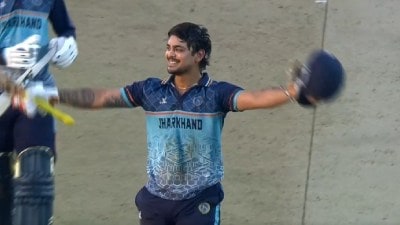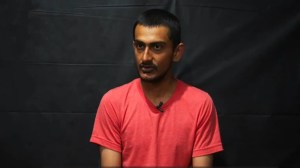Click here to follow Screen Digital on YouTube and stay updated with the latest from the world of cinema.
Sikandar Ka Muqaddar: After A Wednesday, Neeraj Pandey again reveals a political conscience
From the taut brilliance of A Wednesday and Special 26 to the slow-burn intensity of Baby, and even the quieter undertakings like Aiyaary, the journey is never about the surprise itself, but the path he takes to uncover it.
 Sikandar Ka Muqaddar, a Netflix original featuring Jimmy Shergill, Avinash Tiwary, and Tamannaah Bhatia.
Sikandar Ka Muqaddar, a Netflix original featuring Jimmy Shergill, Avinash Tiwary, and Tamannaah Bhatia.
Nobody adores the pencil-thin moustache quite like Neeraj Pandey. For him it is more than an aesthetic. It’s a signature. A nod to a bygone archetype of masculinity. Steeped in retro sensuality and laced with a quiet arrogance. His men, groomed with moustaches that seem to sketch their purpose. They navigate cavernous corridors and rooms. Their movements synchronized to a slick, almost spectral background score. It feels less like a film and more like an ode. A love letter to Navketan Films. An invocation of a lost era where SD Burman’s melodies hung in the air like whispered incantations. His frames evoke Dev Anand’s poetic gait and Vijay Anand’s restless genius. As if Pandey is searching for fragments of their essence in every brow raised, every echo of footfall. Each moment seems less directed and more conjured. An act of communion with ghosts of the golden age.
It is only fitting that his films revel in thrills. Cheap thrills. He has sculpted a career out of the art of revelation, of crafting moment upon moment of calculated astonishment. Not every effort lands with precision. But each is undeniably engrossing. From the taut brilliance of A Wednesday and Special 26 to the slow-burn intensity of Baby, and even the quieter undertakings like Aiyaary, the journey is never about the surprise itself, but the path he takes to uncover it. His craft feels less like the flamboyant strokes of Abbas-Mustan and somewhat like the restrained intrigue of Sriram Raghavan. And always shadowed by the ghost of Anand. To watch a Pandey film is to know the destination, but to be teased by the unfolding.
Sikandar Ka Muqaddar trailer:
With his latest venture, Sikandar Ka Muqaddar, a Netflix original featuring Jimmy Shergill, Avinash Tiwary, and Tamannaah Bhatia, the expectations soared for many reasons. First, Pandey’s previous outing, Auron Mein Kahan Dum Tha, was a massive letdown. Second, he was returning to a territory where his storytelling feels both effortless and exhilarating. And third, the reunion with Shergill, an actor who has often anchored Pandey’s narratives with commanding force, promised sparks of something extraordinary. The excitement only deepens as the film opens with two superbly shot long takes, traversing locations and setting a pulsating tone. Then comes the heist. An exhibition disrupted. Cries of heeron ki chori echoing as the stage is set for a cat-and-mouse game. The atmosphere feels unmistakably vintage, evoking an old-school charm, and if rendered with Pandey’s signature precision, it holds the promise of a thrilling escapade.
But, it must be said that Sikandar Ka Muqaddar marks another misstep for Pandey. What begins as a promising canvas is steadily unraveled by a series of misjudged choices. Each scene, each performance, chipping away at its potential. Even Shergill often appears uncharacteristically weary. The build-up falters, the climactic twist is telegraphed from the very first frame, and the destination offers little more than a yawning sense of inevitability. The cat-and-mouse dynamic never truly finds its rhythm. And the romantic subplot — historically Pandey’s Achilles’ heel — once again undermines the central premise. However, amid the crumbling text, it is the subtext that emerges. There is a captivation in its layers. An undercurrent worth pondering, teasing meaning even as the film’s surface fails to hold attention. Long after the credits roll, it is the subtext that lingers — haunting, suggestive, demanding to be unpacked.
Much like Anand, Pandey ventures into uncharted territory, doing something he has never attempted before. The heeron ki chori is not the backbone of the plot, but a clever MacGuffin — a narrative device that exists to unearth something far more compelling. Pandey wields it to expose the frailty of male egos and the all-consuming obsessions that unravel lives. So, at its heart, the subtext suggests that the line between hunter and hunted dissolves when the chase extends far enough. Both Tiwary, the suspect, and Shergill, the officer, become distorted mirrors of one another — equally unhinged, equally consumed by their fixations. Over 15 relentless years, their pursuit becomes less about justice or escape and more about seeing the other fail spectacularly. This is not a story of triumph but of descent. A captivating exploration of fragile identities, destructive instincts, and self-centeredness so profound that it consumes everything in its path. In their pursuit of victory, they lose the very essence of themselves, leaving behind only the wreckage of what once was.
What’s particularly striking is how, for perhaps the first time since A Wednesday, Pandey reveals a political conscience. He holds a mirror to the institution of law enforcement, exposing the flimsiness of their vaunted instincts and the dire consequences of their errors. He dismantles the myth of infallible cops. Those who, in their desperation to uphold an unblemished success rate, can wrongfully accuse and, in doing so, destroy lives. He also doesn’t shy away from the aftermath either. Showing the unfading scars left on those unjustly labeled as criminals. This dual lens — examining the moral degradation of a cop and the existential despair of a suspect — forms the core of the film’s subtext. What’s more fascinating is how Pandey blurs these moral boundaries, reversing roles and expectations with a deftness that reminds you of his prowess when he reins in his indulgences.
Some of Pandey’s indulgences are, in their own way, delightful. Take the casting of Divya Dutta (Kaushalya) as Shergill’s wife. A choice that immediately reminds you of Special 26, where the two once wore their police constable roles like a second skin, their chemistry heartwarming. Or even the title, Sikandar Ka Muqaddar, a playful invocation of Prakash Mehra’s classic. In that tale, Sikandar wrestled with his destiny, defying its cruelties even as it stripped him of everything. Here, however, Sikandar is no warrior against fate. He is its author, penning his own muqaddar with each calculated move. Much like Pandey himself, who never quite loosens his grip on the characters he creates. The moment they begin to breathe a little too freely, showing signs of agency, of intellect, he pulls them back, reminding them — like a sculptor tugging at the clay — that their fate is not theirs to choose. It is his. He writes it. Because, Oops, he can’t let them make their own destiny. He always has to make it for them.
- 01
- 02
- 03
- 04
- 05


































